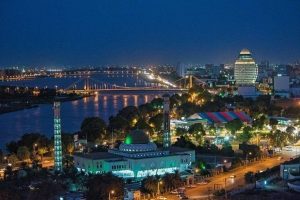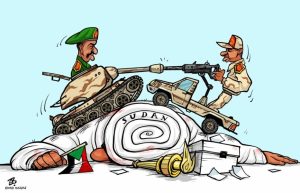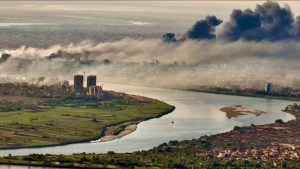
*TRIGGER WARNING: This article includes a discussion of WAR, VIOLENCE and other WAR-RELATED discussions that may cause distress. Please read at your own discretion *
Fatima is one of our amazing ambassadors. She is so committed to creating change in the world, and an inspiration to us all. She shared her story with us recently, and we had to share it with you all because while we are all overwhelmed by the news at the moment, the increasing numbers we see represent people and families, with hopes, fears and dreams. Thanks for sharing Fatima x
Watching the news, I thought I knew what war must feel like, but when it was my own family living in the midst of an all-out war, I realised I was wrong. In those moments, one comes to the realisation that the world out there is not a safe place. Many people don’t know about the war in Sudan but I feel it’s my responsibility to shed light on the ongoing situation.
Since gaining independence in 1956, Sudan has endured three civil wars, the latest being the most devastating. The war erupted between two groups: the Sudanese Army, led by Abdel Fattah al-Burhan, and the Rapid Support Forces (RSF), led by Mohamed Hamdan Dagalo, also known as Hemedti. In 2019, The RSF participated in a military coup that removed Omar al-Bashir after months of demonstrations against his 30-year rule. Both the Army and the RSF were running the country together until relations broke down on April 15, 2023. My cousin told me that when the war broke out while she was in school sitting an exam, when suddenly the building started shaking, gunfire and explosions could be heard, fighter jets were seen around the city, and military tanks were everywhere. This sounded like a movie, but it was all too real.
Over the past few months, the Sudanese army and the RSF have demonstrated a flagrant disregard for the safety of the Sudanese people. The scariest part of the war was when we heard that large groups of RSF soldiers had entered our home in Sudan. They were held at gunpoint after being accused of weapon possession. The RSF has informants in different cities and the informants reported our family for having military connections in the past. Some of the information was correct, as my grandfather, who Omar Al Bashir assassinated in an aeroplane crash in 2001, held the position of Commander of the Military Corps, known as General Malik Elagib Haj Elkhider, and also served as a Consultant Orthopaedic Surgeon. However, my family did not possess any weaponry, and the RSF didn’t believe them until they saw evidence that our claims were true. When they found nothing, they resorted to stealing all our cars and money. The worst part is that there were children in the house. Is there any justification as to why a child has to witness this? The RSF has used civilians as hostages and human shields, and that could have easily happened to my family.

When no one is prepared for war, necessities become a luxury. Food and water become scarce, electricity is cut off from all families, and shelter becomes the priority. People have to adapt to the war; those who do not adapt to the living crisis are the ones with a higher chance of death. Survival is the goal. If a small shop briefly opens, people have to stock food that lasts for a long time, such as rice. This is easier said than done, as leaving your house to buy food might cost you your life. The problem wasn’t just about going outside but that food prices massively increased and things became more expensive and inaccessible because people are out of work. Many of us want to reach our maximum potential, but when fulfilling a human’s basic needs becomes a struggle, self-actualisation becomes the least of worries.
So far, with this war, we have lost so many friends and family members. Civilians are always caught in the crossfire; they’re collateral damage. An incident that disturbs my family was when a relative was at home and, due to the fighting between the military and RSF, she was hit inside her home with live ammunition that broke through the window. In an attempt to escape the escalating violence, people tried to seek refuge in rural cities; however, the RSF extended their reach to these areas as well. Another death that has recently occurred happened when another family member was attacked in his own home by the RSF and was shot and killed. His son was shot too, but he is in critical condition. The war is not just between two leaders who are hungry for power, but a leader with a ruthless strategy to terrorise innocent civilians to inflict fear and win the war.

With hospitals, airports, schools, banks, and much more destroyed, you may think that leaving a country is easy, but sadly it’s not. Due to the unsafe routes, transportation costs have increased. Some bus drivers that travel between Sudan and cross the border in Egypt demand $40,000 or more. The UN has called Sudan the “world’s worst displacement crisis,” with the number of people uprooted from their homes surpassing seven million. People are spending their life savings seeking shelter, but with almost no job opportunities available, escaping is difficult.
I asked my family how they cope with the ongoing hardship, and they told me, “people harden with time.” However, they can find hope and resilience as they believe that the “glass is always half full.” Even though the situation is far from ideal, they are grateful they’re still alive. In moments of struggle and difficulty, clichés seem to make perfect sense; they make a complicated situation feel more manageable.
Sudan is currently bleeding, and even though I am far from home, the pain is deeply felt.
While I may be unable to stop the war, what I can do is tell people about the terrible injustice that is happening. Sometimes I wonder why my people have to go through this, but that’s when I remember that I was given the opportunity to echo their voices and show the world their struggles as they continue facing the challenges of war. The question remains: who stands to gain from the continued suffering in Sudan, and in the wars that continue in other parts of the world?


